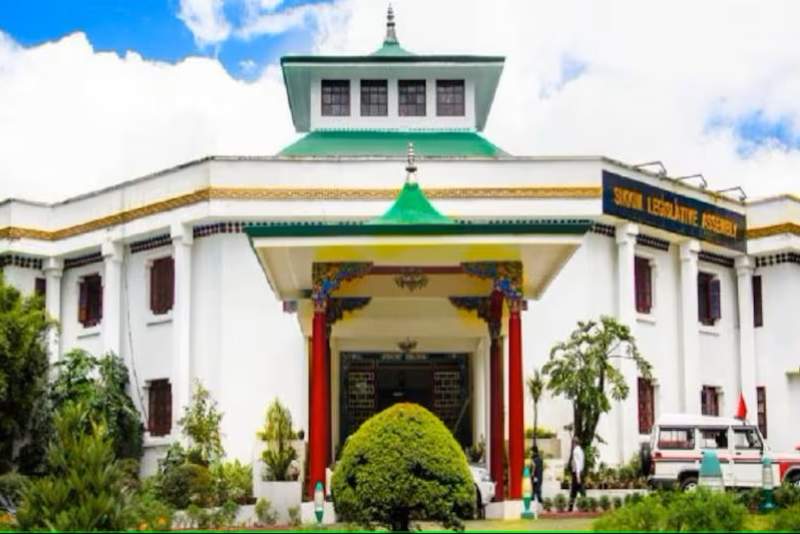
Resolution to put old settlers in ‘others’ category
Gangtok: In a recent development, the Sikkim Legislative Assembly passed a resolution requesting an amendment to the Income Tax Act 1961. The resolution proposes placing the two newly added groups to the Sikkimese definition under sub-section 26AAA in the “Others” category, thus segregating them from the three ethnic communities defined as Sikkimese as per the Tripartite Agreement of 8th May 1973.
The Tripartite Agreement, defined the term “Sikkimese” as Lepcha, Bhutia, and Nepalis who were of Sikkimese origin, having domiciled in Sikkim and registered under Sikkim Subject Register as per the Sikkim Subject Regulation 1961 only. However, with the recent Finance Act 2023, clauses (iv) and (v) have been inserted in the explanation under sub-section 26AAA of Section 10 of the Income Tax Act, 1961, diluting the definition of the term “Sikkimese.” This move has deeply hurt the feelings and sentiments of the people of Sikkim and created apprehension in their minds.
To address these concerns, Law Minister Kunga Nima Lepcha proposed the resolution to establish beyond any doubt that the term “Sikkimese” shall mean the three ethnic communities of the State, i.e., Lepcha of Sikkimese origin, Bhutia of Sikkimese origin, and Nepali of Sikkimese origin only. The resolution requests the Government of India to consider the issue and extend all possible help and support, as always, to protect the distinct identity of the Sikkimese people.
The resolutions proposed and passed include a request to the Government of India not to include persons mentioned in clauses (iv) and (v) of sub-section 26AAA of section 10 of the Income Tax Act 1961 in the definition of “Sikkimese” and to issue necessary clarification in the form of a notification giving separate category to the individuals or persons mentioned in clauses (iv) and (v) of sub-section 26AAA of section 10 of the Income Tax Act 1961 and put them in the “Others category” in the above said Act for the purpose of income tax exemption only and maintain the exclusivity of the term “Sikkimese.”
Also Read: Pawan Kumar Chamling marshalled out of Sikkim Assembly, claims democracy under threat
The resolutions proposed and passed were:
- Request the Government of India to consider the issue and extend all possible help and support, as always, to protect the distinct identity of the Sikkimese people in terms of the May 8, 1973 Agreement and Article 371F of the Constitution and to ensure that the distinct identity and protection guaranteed to the Sikkimese people is not diluted.
- Request the Government of India to acknowledge and maintain that the special status and distinct identity/classification granted to the Sikkimese people are the political commitments and assurances given to the people of Sikkim at the time of merger and definition of “Sikkimese” shall not be diluted and the sentiments of the people of Sikkim is not hurt.
- Request the Government of India not to include persons mentioned in clauses (iv) and (v) of sub-section 26AAA of section 10 of the Income Tax Act 1961 in the definition of “Sikkimese” and issue necessary clarification in the form of a notification giving separate category to the individuals or persons mentioned in clauses (iv) and (v) of sub-section 26AAA of section 10 of the Income Tax Act 1961 and put them in “Others category” in the above said Act for the purpose of income tax exemption only and maintain the exclusivity of the term “Sikkimese”.
- Further request the Government of India to make necessary amendments in the Income Tax Act for putting individuals or persons as mentioned in clauses (iv) and (v) of sub-section 26AAA of section 10 of the Income Tax Act 1961 in the “Others category” in the above said Act for the purpose of income tax exemption thereby segregating the individuals and persons mentioned in clauses (iv) and (v) above from three ethnic communities of Sikkim.
Conclusion:
The Sikkim Legislative Assembly’s resolution highlights the need to protect the distinct identity of the Sikkimese people and maintain the exclusivity of the term “Sikkimese.” It sends a clear message to the Government of India to acknowledge and maintain the special status and distinct identity/classification granted to the Sikkimese people as the political commitments and assurances given to the people of Sikkim at the time of merger.
Gangtokian Web Team, 10/04/23
















































